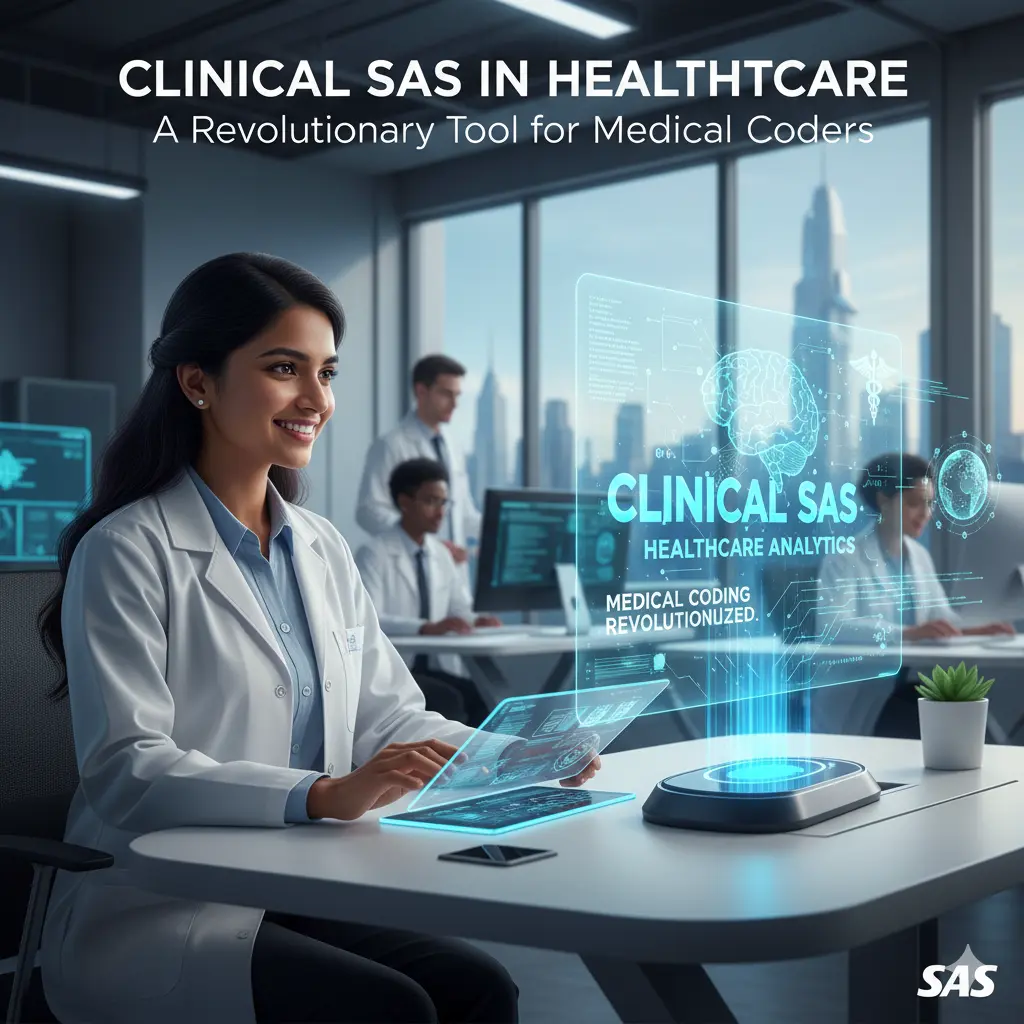Clinical SAS in Healthcare: A Revolutionary Tool for Medical Coders

In the ever-evolving landscape of healthcare, precision, efficiency, and data accuracy are vital. Clinical SAS has emerged as a game-changing tool for medical coders, allowing professionals to manage, analyze, and report clinical data effectively. With the integration of Clinical SAS in healthcare, coding accuracy and healthcare analytics have reached new heights, enhancing both patient outcomes and organizational efficiency. SAS clinical research focuses on managing and analyzing clinical trial data.
Clinical SAS in Healthcare: Complete Guide by IKYA Career
Clinical SAS in healthcare refers to the use of SAS (Statistical Analysis System) software to manage and analyze clinical data. It is widely used in hospitals, pharmaceutical companies, and research organizations to process large datasets, ensuring accurate documentation and regulatory compliance. For medical coders, mastering Clinical SAS for medical coders is becoming increasingly essential to meet the growing demand for data-driven healthcare decisions. A SAS clinical course helps students learn data analysis for clinical research.
Key Highlights:
-
- Enables accurate tracking of patient records and treatment histories
- Facilitates compliance with healthcare regulations
- Supports efficient analysis of clinical trial data
- The SAS clinical course teaches students how to work with clinical trial data.
Role of Clinical SAS for Medical Coders
Medical coders are responsible for translating medical records into standardized codes for billing and reporting. Clinical SAS for medical coders provides tools to simplify this process, offering automation, error detection, and data validation features. By leveraging SAS, coders can reduce manual errors and improve the quality of healthcare documentation. SAS clinical research helps ensure accurate analysis of medical studies.
Benefits Include:
-
- Streamlined coding workflows
- Reduced human errors in data entry
- Improved accuracy in healthcare reporting
SAS Clinical Data Management
SAS clinical data management allows healthcare organizations to handle vast volumes of patient information efficiently. From electronic health records (EHR) to clinical trial data, SAS ensures that data is clean, organized, and ready for analysis. Medical coders trained in SAS clinical data management can enhance operational efficiency and support evidence-based decision-making. SAS clinical programming is used to create reports and datasets for studies.
Key Features:
-
- Integration with electronic health record systems
- Data cleaning and validation
- Generation of comprehensive clinical reports
- SAS clinical programming is important for generating clinical study reports.
Healthcare Data Analytics with SAS
Healthcare data analytics with SAS enables organizations to extract actionable insights from patient data. Medical coders skilled in SAS can contribute significantly to analytics projects, helping to identify trends, predict outcomes, and improve patient care. This analytical capability also supports value-based healthcare and regulatory compliance.
Advantages:
-
- Identification of patient care trends
- Prediction of potential complications
- Optimization of clinical trial outcomes
Benefits of Clinical SAS in Healthcare
The benefits of clinical SAS extend beyond coders to healthcare providers and organizations. By ensuring data accuracy, improving workflow efficiency, and enabling robust analytics, Clinical SAS in healthcare has become a must-have tool in the modern medical ecosystem.
Top Benefits:
-
- Faster and more accurate coding processes
- Enhanced compliance with regulatory standards
- Improved decision-making based on data-driven insights
Medical Coding Career with SAS
A medical coding career with SAS opens doors to numerous opportunities in hospitals, research organizations, and pharmaceutical companies. Professionals trained in Clinical SAS for medical coders are highly sought after, as they can handle complex datasets and ensure precise coding and reporting. A SAS Clinical Research Course prepares students for real-world clinical roles. SAS clinical jobs are available in pharmaceutical and research companies.
Career Highlights:
-
- High demand for SAS-certified coders
- Opportunities in clinical research and healthcare analytics
- Competitive salaries and career growth
- SAS clinical jobs offer stable careers in healthcare analytics.
SAS Certification for Medical Coders
Obtaining a SAS certification for medical coders demonstrates proficiency in handling clinical datasets and enhances employability. Certification programs cover data management, statistical analysis, and reporting, equipping coders with skills to meet industry standards. The SAS Clinical Research Course supports career growth in clinical data analysis.
Certification Benefits:
-
- Validates technical expertise in SAS
- SAS clinical programming is used to analyze patient data easily.
- Enhances career prospects and credibility
- Provides a competitive edge in the medical coding job market
- A SAS clinical course helps learners understand clinical data management.
Integration with Pharmacovigilance
Clinical SAS in healthcare also integrates seamlessly with pharmacovigilance, helping monitor drug safety and adverse events. By combining SAS analytics with pharmacovigilance training, professionals can ensure safer patient outcomes and regulatory compliance. Interested learners can explore pharmacovigilance training, pharmacovigilance training in Hyderabad, or pharmacovigilance courses in Ameerpet for in-depth learning.
Flexible Learning Through Online Courses
For those looking to upgrade their skills, online programs such as medical coding training in Ameerpet and medical coding training offer flexible learning options. Virtual classes allow coders to gain expertise in Clinical SAS for medical coders from anywhere, accommodating professional schedules and enabling self-paced learning. A SAS clinical course provides practical training for working with real clinical research data.
Future of Clinical SAS in Healthcare
The future of Clinical SAS in healthcare looks promising, with growing adoption in hospitals, research institutes, and pharmaceutical companies. As healthcare increasingly relies on data-driven decisions, medical coders equipped with SAS skills will play a pivotal role in shaping the industry. Continuous learning, certification, and hands-on experience will be critical to staying relevant. SAS clinical jobs offer good career opportunities in the pharma industry.
Conclusion
Clinical SAS in healthcare has transformed the role of medical coders, enabling them to handle complex clinical data, improve accuracy, and contribute to healthcare analytics. By mastering SAS clinical data and pursuing SAS certification for medical coders, professionals can enhance their careers and meet the evolving demands of the healthcare industry. The SAS clinical course prepares learners for careers in clinical data analysis and research.
For comprehensive training and career advancement, explore the Ikya Career, a leading platform offering expert guidance in Clinical SAS, medical coding, and pharmacovigilance.
Frequently Asked Questions
-
- What is Clinical SAS in healthcare?
Clinical SAS in healthcare refers to using SAS software to manage, analyze, and report clinical data accurately, enhancing efficiency in medical coding and healthcare operations. - How does Clinical SAS help medical coders?
Clinical SAS for medical coders streamlines coding workflows, reduces errors, and ensures accurate reporting of patient records and clinical data. - What is SAS clinical data management?
Clinical data management involves organizing, cleaning, and validating healthcare data, ensuring it is accurate and ready for analysis or reporting. - Can healthcare data analytics with SAS improve patient care?
Yes, healthcare data analytics with SAS helps identify trends, predict outcomes, and optimize treatment plans, contributing to better patient care. - Is SAS certification necessary for medical coders?
While not mandatory, SAS certification for medical coders validates expertise, enhances career opportunities, and demonstrates proficiency in clinical data management. - Can Clinical SAS integrate with pharmacovigilance processes?
Yes, Clinical SAS can be used in pharmacovigilance to monitor drug safety, report adverse events, and ensure regulatory compliance. - Are there online programs to learn Clinical SAS?
Yes, many online courses, including medical coding training in Hyderabad, offer training in Clinical SAS and related healthcare analytics skills. - What are the benefits of clinical SAS for healthcare organizations?
Benefits include enhanced accuracy in coding, streamlined workflows, compliance with regulations, and support for data-driven healthcare decisions. - Can I work remotely after learning Clinical SAS for medical coders?
Yes, many healthcare organizations and research companies offer remote positions for professionals skilled in Clinical SAS and medical coding. - How does Clinical SAS impact a medical coding career?
Clinical SAS equips coders with advanced skills in data management and analytics, increasing employability, career growth, and opportunities in healthcare analytics.
- What is Clinical SAS in healthcare?




